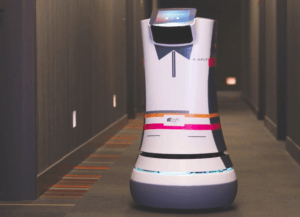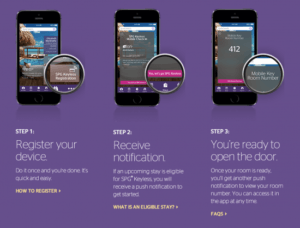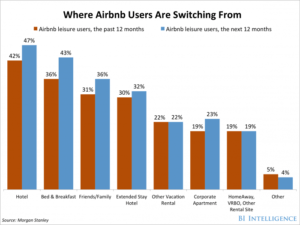When a Hotel Feels Too Much Like Home: Starwood and the Technology Puzzle

The rise of Airbnb over the last several years has threatened the traditional business model of hotels, challenging them to expand their value proposition from one of luxury, consistency, and reliability to one that emphasizes transparency, customizability, convenience, emotional connection, and authentic, local experiences. Leading up to its recent acquisition by Marriot, Starwood Hotels began to leverage technological innovation to deliver upon these expectations and remain competitive with Airbnb. However, as Starwood rampantly implements technological processes across regions, is it also hindering the creation of locally-influenced guest experiences? Does technology deliver a level of standardized convenience that makes even the most remote hotels feel too much like home?
Technology and Hospitality: Airbnb and the Changing Guest
In the last few years, the peer-to-peer technology, Airbnb, has dismantled the traditional hospitality model and given rise to a new type of hotel consumer. By allowing anyone with a spare room to function as a hotelier and to connect instantaneously with potential guests, Airbnb offers the consumer an authentically local experience and significantly expands not only the volume but also the type of supply in the market. With this increased menu, a guest is offered a myriad of choices within a given geography and is able to find a residence which resonates on a financial, personal, and emotional level. Because the Airbnb user is not transacting with a professional proprietor, she must rely on unfiltered reviews and images in order to establish a sense of trust with the seller.
What emerges from this model is a traveler who expects more than the luxury, consistency and reliability offered by the traditional hotel. This new consumer-type is large and growing, spending nearly $2.4 billion on Airbnbs in 2015. [i] [ii] In order to remain competitive and relevant, traditional hotels will have to find a way to transition from an outmoded value proposition to one that includes or improves upon the choice, cost-effectiveness, convenience, authenticity, personalization, transparency, and emotional connection offered by Airbnb. [iii]
How Starwood is Using Technology to Remain Competitive
Through its merger with Marriot, Starwood is hoping to cut costs and achieve a wider array of options for its guests and compete with the cost-effectiveness and breadth of Airbnb.[iv] Independently, however, Starwood has been “leading the hospitality industry in technical innovation” in order to adapt to the needs of the evolving consumer. [v] Starwood has prioritized technology that:
- Enhances transparency and information availability
- The rise of social media and Airbnb together have ushered in an age in which the consumer expects a wealth of unbiased information and evaluation, tilting the balance of power in the guests’ favor. [vi] Starwood was the first major brand to include unedited ratings and reviews on its websites and to crowdsource user-generated comments and photos from social media channels. [vii]
- Improves convenience
- Starwood has invested in an array of digital services that attempt to rival the ease of access and convenience of residential living offered by Airbnb. A mobile app allows guests to bypass check-in and use their phone for keyless entry.[viii] The app also includes a new messaging feature permitting any guest need to be serviced immediately at any hour of the day—an offering supported by the upcoming implementation of “robot butlers” and digitized room-service carts. [ix]



- Starwood has invested in an array of digital services that attempt to rival the ease of access and convenience of residential living offered by Airbnb. A mobile app allows guests to bypass check-in and use their phone for keyless entry.[viii] The app also includes a new messaging feature permitting any guest need to be serviced immediately at any hour of the day—an offering supported by the upcoming implementation of “robot butlers” and digitized room-service carts. [ix]
- Increases opportunities for guest personalization
- While Airbnb tackles customizability through the array of lodging options available on its website, Starwood personalizes the guest experience upon arrival through the use of interactive technology (see table below). Through these tools, Starwood has reimagined its guests as “co-creators” of their unique hotel experience.[x]


- While Airbnb tackles customizability through the array of lodging options available on its website, Starwood personalizes the guest experience upon arrival through the use of interactive technology (see table below). Through these tools, Starwood has reimagined its guests as “co-creators” of their unique hotel experience.[x]
- Evokes emotional connections
- Through its app-based loyalty program and app-embedded social media, Starwood gains insights and data (e.g. birthdays, anniversaries) which it uses to shape a persona-based guest experience. Starwood also utilizes the app to track and maintain guest preferences regarding diet and room climate in order to anticipate their needs prior to arrival.
What else should Starwood be doing (or not doing)?
While Starwood has successfully leveraged technology to deliver upon some of the new areas of demand popularized by Airbnb, its eager embrace of the technological revolution may also, paradoxically, hinder the hotel’s efforts to compete with Airbnb’s most alluring value proposition: the ability to “live like a local.” While technology allows Starwood to compete on matters of transparency, customizability, convenience, and even emotional connectivity, technology, by its very nature, is a force of standardization that ensures that processes and procedures function identically across hotels and geographies; a guest staying at a W Hotel in Los Angeles will be able to check-in in much the same fashion as a guest in the Maldives. What’s more, much of the way in which a hotel delivers an authentic and unique experience is through interaction between guests and staff- whether through an initial welcome offered in a local dialect or a concierge’s vivid description of his nearby upbringing.[xi] As robots and apps displace employees, these opportunities for crafting unique experiences become increasingly limited.
As it implements these technologies across its brands and regions as well as Marriot’s, Starwood should take care to contextualize (or eliminate) each technological initiative as appropriate. For example, Starwood currently has its mobile check-in operating at various spa hotels in exotic regions where a personal greeting with a local beverage could prove emotionally significant. As Starwood scales its digital innovations, it should ensure that its guests feel at home but not too at home.
[Word Count: 794]
[i] CBRE, “THE SHARING ECONOMY CHECKS IN: AN ANALYSIS OF AIRBNB IN THE UNITED STATES”, http://www.cbrehotels.com/EN/Research/Pages/An-Analysis-of-Airbnb-in-the-United-States.aspx, accessed November 2016.
[ii]John Devine, “Is Airbnb a Threat to the Hotel Industry?”, U.S. News, November 2, 2016, http://money.usnews.com/investing/articles/2016-11-02/is-airbnb-a-threat-to-the-hotel-industry, accessed November 2016.
[iii] Suzanne Bearne, “How technology has transformed the travel industry,” The Guardian, February 29, 2016 https://www.theguardian.com/media-network/2016/feb/29/technology-internet-transformed-travel-industry-airbnb, accessed November 2016.
[iv] BI Intelligence, “Marriott-Starwood merger sets stage for intense competition with Airbnb,” Business Insider, September 26, 2016, http://www.businessinsider.com/marriott-starwood-merger-sets-stage-for-intense-competition-with-airbnb-2016-9, accessed November 2016.
[v] Samantha Shankman, “Interview: Starwood CEO on Using Technology to Improve the Guest Experience”, October 22, 2014, https://skift.com/2014/10/22/interview-starwood-ceo-on-using-technology-to-improve-the-guest-experience/, accessed November 2016.
[vi] The International School of Hospitality, “How Technology is Changing the Hospitality Industry,” http://tisoh.edu/how-technology-is-changing-the-hospitality-industry/, accessed November 2016.
[vii] Note: While other properties have made use of Instagram images — or Instagram-inspired images — in their advertising, Starwood is the first to add them to its properties’ websites Source: Jason Clampet, “ Starwood Hotels Adds Guests’ Instagram Photos to Its Hotel Websites,” Skift, December 11, 2014, https://skift.com/2013/12/11/starwood-hotels-adds-guests-instagram-photos-to-its-hotel-websites/#1, accessed November 2014.
[viii] Caroline Baldwin, “How Starwood Hotels is using technology to innovate hospitality,” Essential REetail, April 14, 2016, http://www.essentialretail.com/ecommerce/article/570e6f41e959f-how-starwood-hotels-is-using-technology-to-innovate-hospitality, accessed November 2016.
[ix] Suzanne Bearne, “How technology has transformed the travel industry,” The Guardian, February 29, 2016 https://www.theguardian.com/media-network/2016/feb/29/technology-internet-transformed-travel-industry-airbnb, accessed November 2016.
[x] Jay Kandampully, Anil Bilgihan, and Tingting Zhang, “Developing a people-technology hybrids model to unleash innovation and creativity: The new hospitality frontier,” Journal of Hospitality and Tourism Management, (December 2015).
[xi] Jeff Higley, “Hoteliers Embrace the Age of Authenticity,” Hotel News Now, August 21, 2015, http://www.hotelnewsnow.com/Articles/27502/Hoteliers-embrace-the-Age-of-Authenticity, accessed November 2016.
Images sourced from: http://www.businessinsider.com/marriott-and-starwood-merger-complete-but-airbnb-still-competition-2016-3 and http://www.travelandleisure.com/slideshows/hotel-technology-starwood
Table is self-constructed.




I’m not sure I agree that Airbnb and Starwood are direct competitors. I agree that both offer lodging away from home, but the experiences and value propositions are very different. Starwood has leisure and business customers. The business travelers who are looking for consistency, standardization, and easy booking – not really what Airbnb is offering. Likewise, a portion of Starwood leisure customers are “locked” into Starwood due to the rewards program from business travel (looking at you, former/current/future consultants). So, Airbnb competes with a subset of Starwood leisure guests and of those, I’m not sure how many people staying at the W Maldives are truly looking to “live like a local”. I wonder if Airbnb is actually a bigger threat to hostels (which offer cheaper rooms and a “local” community) and lower-budget hotels (which can compete with Airbnb on price). Finally, at least for now, Airbnb is <0.5% of the global 550B hotel industry (see: http://www.hospitalitynet.org/news/4073336.html), so it hasn't quite taken over just yet.
Thanks for the interesting perspective. I’m rather skeptical about the digitization of the hotel experience. The hospitality industry’s namesake seems to imply a more human experience in making someone feel welcome while being away from home. When returning to a hotel that you frequent whether on leisure or business, you can benefit from the un-digitizable experience of being greeted by a familiar desk staff member, or even the acknowledgment of “Welcome back Miss Wee, what brings you to town this time?” The human touch feels especially valuable after a long flight and the generally unpleasant experience of distance travel. At hotels and even places like Disney World, staff members wear name tags with their country of origin, bringing an interesting global touch to the hospitality experience. At first blush I thought keyless entry sounded really convenient, if I’m paying over $100 if not more for a hotel stay, I’d rather have a more human experience vs. a seemingly low cost scalable digital one.
Also, I agree with Alex K that AirBnB’s “live like a local” does not really translate into the hotel traveler segment. AirBnB seemed to open up a different style of hospitality that wasn’t a widely available option beforehand, but I don’t think hotels should compete to be like AirBnB as that’s a very different experience.
I believe that the technological standardization of the Starwood hotel experience is nothing to fear. When I travel, I try very hard to find authentic experiences and “live like a local” during the day. However, at the end of the day, I want to go back to a clean hotel room where I can get a good night’s sleep and recharge while I recover from jet lag. If I were Starwood, I would use technology to help visitors get out and have authentic experiences during the daytime (i.e., a guided audio tour on your iPhone) and continue focusing on convenience and standardization in the hotel itself, so that tired guests returning from a long day of touring can simply relax.
I would challenge to run so quickly to the conclusion that Airbnb’s value proposition of “the ability to live like a local” is what is driving substitution. Segmentation is important, and building on @alexK comment, I think that is particularly interesting to deep-dive on the needs of business vs. leisure travelers. On one hand, business travelers usually tend to value location, connectivity, loyalty memberships benefits, and convenient all inclusive amenities (continental breakfasts, ironing services, stocked minibars, etc.). On the other hand, leisure travelers have greater attraction to packages discounts, on-site extra facilities (gym, pool, spa, bar, etc.), and probably good recommendations on what to do (even online geo-location advice) [1].
So, while it is true that Airbnb disrupting model poses a threat to hotels –In fact, Morgan Stanley’s survey data points to 19 percent of leisure and 18 percent of business travelers having used Airbnb at least once, and that those numbers will grow to 25 percent and 23 percent, respectively, over the next 12 months [2]– I will be key to better understand the underlying motives that drive substitution (probably by segment), and from that build insights on how the ongoing Digital Transformation in the hospitality industry can help tackle those threats, and differenciate Starwoods (Marrotts?) value proposition in the future.
[1] http://www.e-marketingassociates.com/understanding-differences-business-vs-leisure-travelers/
[2] http://www.bloomberg.com/news/articles/2016-11-14/morgan-stanley-airbnb-s-threat-to-hotels-is-only-getting-sharper
AirBnB’s platform connects lessors and lessees, but so does the internet and app platforms of hotels. With the upcoming Marriott-Starwood merger, the hotel megacompany will offer properties available in many locations that will reduce the attractiveness of AirBnB to customers looking to rent in areas with multiple hotels available.
I also agree that the vast majority of Starwood’s customers do not seek to “live like a local.” As you mentioned, one of the major attractions of hotel chains are the reliability and consistency of the experience, which reduces if not eliminates the risk a customer takes on when using AirBnB; although AirBnB has a series of quality control mechanisms that reduce the risk of a subpar or uncomfortable travel experience, but those risks are nonetheless higher than at a major hotel chain. Furthermore, as a platform that connects property lessors and lessees, AirBnB does not take the level of responsibility for customer experiences that hotel operators do, which limits the recourse a lessee may look to if a bad experience occurs.
For example, imagine a case of pets and fleas. I once slept in a hotel bed that happened to be infested with dog fleas, and the following day I was twitching like Tyrone Biggums as I itched myself nearly to death. The hotel company compensated me and handled the situation in a different way than I’ve experienced with bad stays on AirBnB, which would probably only refund the cost of my stay and say “sorry.” A residence on AirBnB is also far more likely to have had pets (and fleas) living within than a hotel.
AirBnB also fails to offer a major draw of hotels: loyalty programs and benefits. Business and frequent personal travelers often stay at the hotels in which they have loyalty program “status” and Starwood Preferred Guest is one of the most valuable and popular of those programs in the world.
Where I think hotel companies need to compete with AirBnB is in group personal travel. AirBnB, VRBO, and their competitors are the favorite choice of groups like HBS students looking to procure housing for vacations. Hotels do not make it easy to book travel in this way, and their platforms are not oriented for group bookings, instead favoring relationships with event planners and corporate travel agents. Considering that business travel represents only about 60% of the U.S. hotel industry (https://www.statista.com/topics/1102/hotels/), there is a lot of business out there that hotel companies are not currently capturing.
Another action that Starwood should consider is allowing guests to buy the products in their rooms. For example, Westin hotels developed a mattress called the heavenly bed (https://www.westinstore.com/westin-heavenly-bed.aspx) after receiving a lot of interest from guests. Not only is this another revenue opportunity, but it likely attracts these guests to come back to Westin as they know they can depend on the mattress / bed to get a good nights sleep. Ace Hotels also allows guest to buy items from their room. For example, after visiting the Ace Hotel in Pittsburgh, I wanted the robe from the hotel room and was able to purchase it quickly (https://shop.acehotel.com/collections/robes). They could even consider adding a Amazon dash button type device in their hotel rooms so that guests could buy immediately and the hotel could automatically charge their credit card on file. Experiences and convenience are becoming increasingly important in the digital age and hotels like Starwood should continue to focus on both.
I’m not sure if it’s a right comparison to draw between Airbnb and Starwood Hotels for technology reasons. The biggest reason for people choosing Airbnb over is the price factor, not the service. I would say the Starwood Hotels offer a better service compared to most Airbnb locations, so digitization may not be their winning bet to win the Airbnb guests back. I would also say the people who book hotels and Airbnbs are different sets of people; people choose hotels for the luxury aspect and loyalty points, whereas others choose Airbnb for a more cozy experience and lower price.
As a heavy user of both SPG and Airbnb services, I believe the role of each company is very different. Airbnb likes to paint a romantic picture of saving households with financial troubles by helping to monetize the couch or spare room. However, we see more evidence that by dollar volume, the real superhosts on Airbnb are merely converting investors from a sublet motel to a short-term hotel model. http://avc.com/2014/12/what-just-happened/
We also see supporting evidence that Airbnb is moving away from the local immersion experience. They’ve recently created the “suitable for business travel” search features, and asked all of their hosts to update the amenities that reflect business travel. https://www.airbnb.com/business-travel
I agree, the industry will always give a nod to some local customs: asian hotels usually provide free breakfast, fancy western hotels offer turndown service, and SPG elites will be offered a local gift. However, the digital transformation and consolidation of hotel owners is doing more to standardize hospitality across diverse cultures into a more uniform experience.